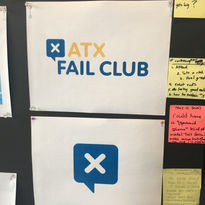/
ATX Fail Club
Project Timeline
Roles
6 months
- Research
- Synthesis
- Presentation/Storytelling
- Ideation
- Lean Development
- Piloting
About
ATX Fail Club was inspired from a design research project seeking to understand how impostor phenomenon impacts women's higher education trajectory, from cultural background through employment.
Website: atxfailclub.com
Teammates: Jen Figueroa & Vicky Pridgen
/
Presentation Video
/
Artifacts
/
Case Study




In the age of social media we are sharing more than ever. We share our most flattering selfies, picturesque vacations, the best side of our relationships, and most delicious looking meals.
But, when was the last time you saw someone share on social media a time when they let someone they care about down, or didn't get a job?
That's because...
Failure is hard to admit, let alone share with others.
During research, we sat down with 18 women, often in their home or workplace to learn about their lives.
We also interviewed 9 subject matter experts who ranged from pastors and therapists to university professors studying the impacts of impostorism on students.
We ended up with over 31 hours of audio data.

Trudy

Genevieve's apartment

Maggie

Trudy




During a timeline exercise interview participants marked milestones, confidence levels, and groups/organizations they've belonged to since high school. This helped us learn more about different factors that may be at play in our interviewee's lives.
One woman, Maggie, told us about a series of serious setbacks that she experienced over the course of a year.
Despite many of these events being outside of Maggie's control it didn't stop her from internalizing them as being her fault and led to severe mental health consequences.
Failures add up and can completely change
the trajectory of a woman’s life

In seeking to understand if this was something specifically affected women, or just people in general, we looked to outside research studies.
One study showed that boys and girls receive very different feedback in the classroom when they fail.
Boys often receive effort based feedback such as "you didn't try hard enough, but you'll do better next time."
While girls receive ability based feedback, such as, "you're just not good at math."
Men are not raised to internalize failures the way women are so they are often able to fail upward. Persisting through and learning from setbacks.
Women on the other-hand may attribute setbacks, whether they are in their control or not, to their own abilities. This can lead them to internalize failures, take them personally, and change course starting over on a new path instead of persisting.
When we charted this pattern repeating over time we were struck by the gap between the two genders that emerged, and it reminded us of some other gender gaps that exist.
This is the wicked problem space that ATX Fail Club is passionate about working in.



ATX Fail Club exists to cultivate communities where women-identifying humans are encouraged to share and celebrate failure.
We then set about piloting and testing this business concept.
I led the creation of our website, and we launched social media channels to validate our hypothesis that women are interested in sharing and celebrating failures.
Over 2 months, 192 people visited our website, and of those 66 signed up to be on our email list.
One in every three people who visit our website join the club!
Then we began validating the assumption of reframing failure by piloting failure dinners.
Failure dinners create a safe and fun environment for women to come together and share personal stories of failure with each other over food and drinks.
We follow the dinner and stories with an interactive activity.
At our second dinner event we conducted a “fire ritual” in which women wrote down their feelings of failure that they wanted to leave behind, and burned them in a fire.

Piloting the second failure dinner - prep

Piloting the second failure dinner - mingling

Piloting the second failure dinner - fire ritual

Piloting the second failure dinner - prep
At ATX Fail Club we aim to reframe failure as a necessary part of success.

So, most importantly, were these dinners impactful? Does ATX Fail Club programming have the potential to effect behavioral change?
We measured impact by sending post-event surveys to attendees and received overwhelmingly positive responses!
In order to normalize failure we must share our experiences with others.
And because we know that sharing is a key factor we are looking at developing more channels to do this:
-
Fail Mail - where people can share failures remotely and anonymously.
-
Company Programming - to help organizations develop a culture that appreciates and respects failures as learning experiences and part of success.
-
Public Storytelling - larger co-ed events similar to the moth, but for stories of failure.
-
Group Outings - where women can be vulnerable and try new things with the club that they may not have on their own.
We welcome you to join the club! Visit our website or follow us on social media to stay in the loop as we expand, or reach out if you're interested in partnering.





























